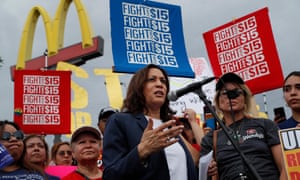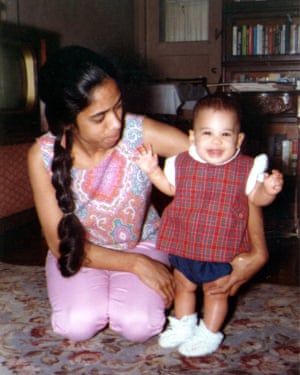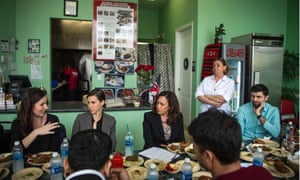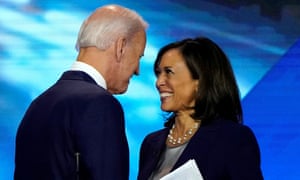Extract from The Guardian
The former prosecutor and senator is the first woman to fill her
upcoming White House role. What does her life so far tell us about how
she will govern?
by Arwa Mahdawi
Kamala Harris has spent her life crashing through glass ceilings and accumulating “firsts”. She was the first female district attorney of San Francisco, the first female attorney general of California, the first Indian American in the US Senate, the first Indian American candidate of a major party to run for vice-president. Soon she will become the first female vice-president. If Joe Biden only serves one term, as expected, there is a chance that in 2024 she could become the first black female president.
The problem with phrases like “first black female president” is that they confine the California senator to the sort of boxes she has always tried to avoid. “When I first ran for office that was one of the things that I struggled with, which is that you are forced through that process to define yourself in a way that you fit neatly into the compartment that other people have created,” she told the Washington Post last year. “I am who I am … You might need to figure it out, but I’m fine with it.” She does not agonise over her identity – she simply calls herself a “proud American”.
As with Barack Obama, there are those who have doubted Harris’s Americanness. The morning after Harris was named as Biden’s running mate, racist “birther” conspiracy theories, amplified by Donald Trump, began to circulate. Newsweek published an op-ed questioning whether Harris was “constitutionally ineligible” to become president because her parents, who met at graduate school in Berkeley, were immigrants. Her mother, a breast cancer researcher, was born in India. Her father, an economist, is black and was born in Jamaica. Harris, meanwhile, was born in Oakland, California. Which, to be very clear, means the 56-year-old is a natural-born US citizen and eligible to run for president.
Left: Kamala Harris with her mother, Shyamala Gopalan Harris, a breast cancer researcher.
Right: At her mother’s lab in Berkeley, California.
Above: Harris, right, with Gwen Whitfield at an anti-apartheid protest in 1982 during her freshman year at Howard University in Washington. Photograph: AP
Canada has also laid claim to Harris: she lived in Montreal between the ages of 12 and 17 because her mother got a job there. (Harris’s parents divorced when she was seven, and her mother raised the children.) To begin with, Harris found it hard to find her feet – not least because the first school she went to was Francophone. Her go-to phrase was “Quoi? Quoi? Quoi?”, which means “What? What? What?” but to French speakers also sounds like quacking. “I used to joke that I felt like a duck,” she wrote in her memoir.
Is Harris a careerist or an activist? Is she pragmatic or progressive? These are questions that have been debated for years.
Before long, however, Harris had thrown herself into an all-female dance troupe called Midnight Magic and, when not dancing, was spearheading demonstrations. Aged 13, she mobilised the neighbourhood children to protest against rules that stopped them playing on the lawn in front of their apartment building. The protest was a success. Later, when the Canadian version of prom rolled around, Harris was part of a group who decided to go without a date so that people who had not been asked out would not feel left out.
After finishing high school in Canada, Harris went to Howard University, a historically black university in Washington DC. From there she went to the University of California’s Hastings college of the law. At both places, the Washington Post notes, “Harris was more careerist than activist, winning competitive internships and joining academic societies”.
But is Harris a careerist or an activist? Is she pragmatic or progressive? These are questions that have been debated for years.
Kamala Harris, the then San Francisco district attorney, signing election papers in 2008 to run for California attorney general, the top law enforcement officer in the nation’s most populous state. Photograph: Ben Margot/AP

“Kamala is a cop”, a reference to Harris’s record as a prosecutor, was a meme throughout her campaign: in an age in which police brutality is top of the mind, her 13-year career in law enforcement has been a point of contention. During her time as San Francisco district attorney, for example, she boasted about raising the overall felony conviction rate from 52% in 2003 to 67% in 2006, the highest in a decade. Her tough-on-truancy laws led to parents of habitually truant schoolchildren going to jail. As California’s attorney general from 2011 to 2017, her office argued against releasing eligible non-violent inmates early because “prisons would lose an important labour pool”. After the shooting of Michael Brown in Ferguson, Missouri, she rejected calls from civil rights groups to investigate deadly police shootings in San Francisco. She has since spoken out against police brutality.
Harris’s law enforcement record has not stopped the right from calling her a radical socialist, however. In one interview with Fox Business, Trump called her “the most liberal person in the US Senate”.
To say Harris has any sort of agenda might be a stretch. One of the key criticisms of her has been a lack of consistency. In 2004, for example, she said she gave her word to the people of San Francisco that she opposed the death penalty. In 2014, after a federal judge ruled California’s death penalty unconstitutional, Harris appealed against the decision. During her campaign she could not seem to make up her mind whether she was courting the left or the moderates: she initially backed Bernie Sanders’ Medicare For All plan, for example, then backpedalled and introduced her own, more centrist healthcare plan.


Above: Democratic presidential candidate Senator Harris speaking to people protesting for a higher minimum wage outside a McDonald’s in Las Vegas in 2019. Photograph: John Locher/AP
Below: Harris and her husband, Douglas Emhoff (wearing ‘Kamala’ T-shirt), attending 2019’s Pride parade in San Francisco soon after the debate where she challenged Joe Biden’s record of opposing bussing to desegregate schools. Photograph: David Paul Morris/Getty Images
Harris’s past is a mixed bag, then. What about the future? Will Harris veer to the left or stay firmly in the centre? Again, it is likely to be a mixed bag. She is to the right of the Democratic party on Israel, for example, but to the left when it comes to the climate crisis. Harris supports the “green new deal” and has vowed to eliminate the filibuster in order to pass it; she has also said she would get the Department of Justice to hold oil and gas companies accountable. It is also likely Harris will catalyse more discussion about systemic racism, but it is unclear how much she will do to actually try to dismantle it. She has, for example, drawn attention to the way that people of colour are disproportionately dying from Covid-19 and announced legislation to support bias and anti-racism training for workers involved in the Covid-19 response. While that’s important, anti-bias training is a largely symbolic response to a systemic issue. Also unclear is how much she will reform immigration policies. Her first priority is to “roll back Trump’s anti-immigrant agenda” and she says she supports more comprehensive reform, but this is yet to be fleshed out.
'Her first priority is to 'roll back Trump’s anti-immigrant agenda'
Immigration is not the only part of Trump’s record she plans to take on. Harris has said her administration’s Department of Justice “would have no choice” but to pursue criminal obstruction of justice charges against Trump for his apparent collusion with Russia as outlined in the Mueller report. This should make the former president feel very nervous indeed; Harris is a formidable opponent and, as her 2018 grilling of Brett Kavanaugh clearly shows, unafraid to take on powerful men.
Above: Harris meeting attorneys, refugees and visa holders detained in Los Angeles during Trump’s travel ban in 2017. Photograph: Sarah Reingewirtz/Rex
Below: Biden and Harris talking after the Democratic presidential debate in Houston in September 2019. Photograph: Mike Blake/Reuters
In all this, she will be able to count on the support of her family. Her husband, Douglas Emhoff, is a corporate lawyer who took a leave of absence to support her on the campaign trail. The pair met on a blind date and married in 2014. Harris is “dear friends” with Emhoff’s ex-wife, who also helped Harris’s presidential bid, and close to his children, who affectionately call her “Momala”. “We sometimes joke that our modern family is almost too functional,” Harris wrote in her memoir.
Whatever happens next, Harris’s vice-presidency will make history. She will be the first black American and the first Asian American to hold the country’s second highest office. It is hard to overstate how powerful that is after four years of Trump.






No comments:
Post a Comment